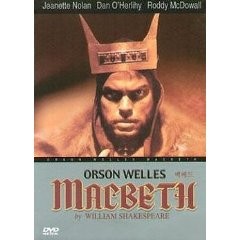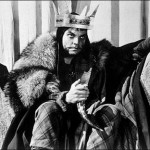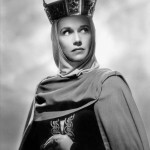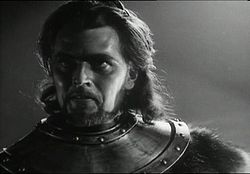 Before Citizen Kane, and before the Mercury Theater’s radio production of War Of The Worlds, Orson Welles was the wonderkid for his stage productions. He gained fame and notoriety for fresh and inventive productions of classic theater. Most notably among these was his production of Macbeth.
Before Citizen Kane, and before the Mercury Theater’s radio production of War Of The Worlds, Orson Welles was the wonderkid for his stage productions. He gained fame and notoriety for fresh and inventive productions of classic theater. Most notably among these was his production of Macbeth.
Using an all black cast he staged Macbeth on a Jamaican plantation with a cast that was inexperienced on the stage. The production was a smash hit, propelling the young Welles on his way to stardom.
After the trouble Welles found with the studio system and his bruising combat with William Randolph Hurst over Welles’ first film, Citizen Kane, perhaps it was natural that Welles returned to Shakespeare looking for his cinematic redemption. Welles convinces second tier studio Republic, best known for westerns, to support his Macbeth.
The version I watched last night is a version that Republic did not release. It was part of Welles’ that ‘the Scottish Play’ be done with Scott accents. The studio rebelled when it heard the final version and order all the dialog redubbed with the actors playing the parts in their native accents. This version is not currently available in the United States on DVD. The image above is from a Korean import which I purchased a few months ago.
Working with a limited budget and severe time and production constraints forced Welles to make a film version of Macbeth that is a curious hybrid of film and theater magic. The sets for the most part are open and impressionistic. Welles uses a number of stage conventions in presenting the story, backdrops and lighting effect feel much more like a Broadway production than one born of Hollywood. However, it is a hybrid and not a filmed play. Welles uses what limited production resources his had very effectively in created a mood that is dark, somber, and with a hint of horror.
 Orson Welles cast himself in the titular role of Macbeth. People may unfairly remember Welles from a number of lesser jobs he had towards the end of his career. Such as playing a planet sized robot in the animated Transformers: The Movie, or selling no wine before its time. This is a disservice to a man who possessed considerable ability as an actor. Citizen Kane would not have worked is Welles had not has the acting chops to pull it off. Personally I think he made a wonderful Macbeth. Macbeth’s collapse into madness is wholly credible in Welles’ capable hands. He is at turns decent, fearful, and fearless and all of played as a whole human spirit.
Orson Welles cast himself in the titular role of Macbeth. People may unfairly remember Welles from a number of lesser jobs he had towards the end of his career. Such as playing a planet sized robot in the animated Transformers: The Movie, or selling no wine before its time. This is a disservice to a man who possessed considerable ability as an actor. Citizen Kane would not have worked is Welles had not has the acting chops to pull it off. Personally I think he made a wonderful Macbeth. Macbeth’s collapse into madness is wholly credible in Welles’ capable hands. He is at turns decent, fearful, and fearless and all of played as a whole human spirit.
For Lady Macbeth Welles cast a radio actress with no screen experience, Jeanette Nolan. Clearly Welles knew she could perform as a screen actress as IMDB lists 194 acting credits to her varied and lengthy career. (This makes the second film in my library with Ms. Nolan; she also appeared in The Man Who Shot Liberty Valance.) I can say without equivocation and doubt that she is this time my favorite actress to portray Lady Macbeth.
Clearly Welles knew she could perform as a screen actress as IMDB lists 194 acting credits to her varied and lengthy career. (This makes the second film in my library with Ms. Nolan; she also appeared in The Man Who Shot Liberty Valance.) I can say without equivocation and doubt that she is this time my favorite actress to portray Lady Macbeth.
Jeanette Nolan captured the multifaceted and deeply conflicted character that is Lady Macbeth. In lesser hands, and I speak both of directors and actresses, Lady Macbeth comes off as a shrew. A harpy who badgers her husband into murder for her whole ends and lust for title. Here she is much more than that. In scenes immediately following the murder of King Duncan –no spoiler warnings on stories more than 400 hundred years old — we can see that the act has taken a deeper toll on Lady Macbeth than she will allow anyone, including her husband to know about. Her fall into madness does not spring up out of nowhere, we can see the seed in that moment. I wish also admit that she plays the seductive nature of the character extremely well. I was both attracted and repulsed by her, often at the same time. A masterpiece of work, all the more impressive for her screen novie status.
 To play Macduff Welles cast irish actor Dan O’Herlihy. O’Herlihy is best know to genre fans for two films, Robocop where he played ‘The Old Man’ CEO of Omni Consumer Products, and 1984’s The Last Starfighter where he was under heavy make-up as the alien engineer Grig.
To play Macduff Welles cast irish actor Dan O’Herlihy. O’Herlihy is best know to genre fans for two films, Robocop where he played ‘The Old Man’ CEO of Omni Consumer Products, and 1984’s The Last Starfighter where he was under heavy make-up as the alien engineer Grig.
O’Herlihy brought a real power to the character if McDuff. That is not to say the character lacked power, but in O’Herlihy’s hands I really felt the controlled rage and fury of a medieval Scottish warrior. The fight between Macduff and Macbeth does not transpire off stage as it does in the text of the play and it does not play a fencing, but rather as two men with broadswords out the chop their opponents into ground beef.
Malcom. King Duncan’s son, is played by the very talent actor, Roddy McDowall. (On the right in the photo.) Roddy McDowall had a long and varied career in films. He started out as a child actor and had a number of films under his belt by the time he came to Welles’ Macbeth. As parts became scarcer, which happens often when child actors become young adults, he left Hollywood to study acting and tread the boards of Broadway. he won acclaim as the villainous Mordred in Camelot with Richard Burton and Julie Andrews. As Malcolm he delivered another good performance, though Welles had cut down Malcolm parts so he has less to do than in the original text.
(On the right in the photo.) Roddy McDowall had a long and varied career in films. He started out as a child actor and had a number of films under his belt by the time he came to Welles’ Macbeth. As parts became scarcer, which happens often when child actors become young adults, he left Hollywood to study acting and tread the boards of Broadway. he won acclaim as the villainous Mordred in Camelot with Richard Burton and Julie Andrews. As Malcolm he delivered another good performance, though Welles had cut down Malcolm parts so he has less to do than in the original text.
Edgar Barrier an actor whose work I am unfamiliar with played Banquo, Macbeth”s trusted friend in arms and the other person to receive a prophesy from the three witches. I could not find a screencap of his portrayal as Banquo, but he played the part well and with a sly subtlety which gave the impression the Banquo understood more than he let people know.
Look at this cast. It is tremendous. I can only imagine what sort of film Orson Welles would had given the world had he had a properly budget. This is not a flawed film, not by any means. It has swiftly become my second favorite Macbeth production. (The first being the 1973 TV production with Ian McKellen, the subject of a previous Sunday Night Movie post.) Howvere to compare these two productions is grossly unfair to both.
One is very much a play set for television, though with deft and talented uses of the scree that could not be done in a play. While this one is a film and uses a films perspective to illuminate the scenes. For example the dinner scene where Macbeth sees Banquo’s ghost. Welles gives it to us in two distinctly different points of view, Macbeth’s and everyone else’s. Fine and good, lots of directors have done that. Welles truly climbed into Macbeth’s point of view. When it is objective, we see Macbeth. his face contorted in terror at the specter, but the chair is empty in a room full of people. While in Macbeth’s point of view the room is empty, there is no one there save Banquo’s ghost. It was a chilling way to present that dramatic scene.
Sadly I cannot recommend that you rent this DVD, as it is not available for rent. I took a gamble I rarely do and purchased it without having ever seen the film. I do not regret it. If you want to see the same version, you’ll have to run that same risk.
In my opinion — and your milage may vary — it is worth it.

Pingback: Lady Macbeth » Blog Archive » Lady Macbeth
The brogues were not thick or heavy, so I do not think that was the reason they were forced to re-dub the dialog. I found the actors no harder to understand than I did in Braveheart.
I might, regretfully, agree with the studio regarding Scots accents. It can be difficult to understand the words through a thick brogue.
I am currently inthe middle of “Elizabeth, The Golden Age”. They have just beheaded Mary, Queen of Scots, for treason. I had to listen to the character speak with a pronounce Scots brogue and had to re-run sections with subtitles in English to understand all that was said. (My real irritation is that Mary was sent to France at five years old under a betrothal agreement and most likely had French-accented English, rather than Scots. I hate it when films, passing themselves off as accurate, make simple mistakes in things easily checked.)